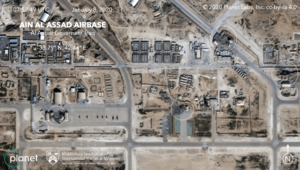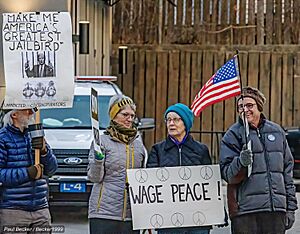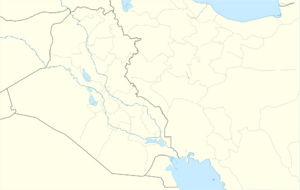Operation Martyr Soleimani facts for kids
Quick facts for kids Operation Martyr Soleimani |
|
|---|---|
| Part of events that followed the assassination of Qasem Soleimani during the 2019–2021 Persian Gulf crisis | |

Damage (encircled) to at least five structures at Ayn al-Asad airbase in a series of missile attacks by Iran
|
|
| Operational scope | Military strike targeting multiple sites |
| Location | Al-Asad Airbase, Al Anbar Governorate, Iraq 33°48′N 42°26′E / 33.800°N 42.433°E |
| Planned by | |
| Target | Al-Asad Airbase Erbil Airbase |
| Date | 8 January 2020, from about 1:30 a.m. to 4:00 a.m. (UTC+03:00) |
| Executed by | |
| Outcome | 11 Qiam 1 missiles hit Al-Asad Airbase |
| Casualties | |
On January 8, 2020, Iran launched a military operation called Operation Martyr Soleimani. Iran's Islamic Revolutionary Guard Corps (IRGC) fired more than 12 ballistic missiles at two airbases in Iraq. One target was the al-Asad Airbase in western Iraq. The other was an airbase near Erbil. This attack was a response to the killing of Major General Qasem Soleimani by a United States drone strike.
This was the largest ballistic missile attack ever against U.S. forces outside of the United States. At first, the U.S. did not fully admit how serious the attack was. They first said no service members were hurt or killed. However, the U.S. Department of Defense later reported that 110 service members had traumatic brain injuries. These were mainly concussions. Some of these soldiers later received the Purple Heart medal.
Iran reportedly told the Iraqi government about the attack just before it happened. The United States Secretary of State Mike Pompeo said the attack was meant to kill people. But some experts thought the attack was planned to avoid deaths. This way, the U.S. might not strike back with force. The U.S. said it avoided deaths because the United States Space Force gave an early warning.
In the months after the attack, the U.S. sent Patriot and other missile defense systems to some of its bases in Iraq.
Contents
Reactions to the Attack
After the missile strikes, many countries and leaders shared their thoughts. Here's how different groups reacted.
Iran's Response
Iran sent a letter to the United Nations. They called the missile strikes a "measured and proportionate" act of "self-defense." They said the strikes were precise and only hit military targets. This meant no harm to civilians or their property.
Amir Hajizadeh, an IRGC commander, later said Iran was ready to fire thousands of missiles. This would have happened if the U.S. had fought back.
Iran's foreign minister, Javad Zarif, said the attack was legal. He tweeted that Iran acted in self-defense under Article 51 of the UN Charter. He also said Iran did not want more fighting or war. But he added that Iran would defend itself. He later said the U.S. needed to "come to its senses" and stop its actions in the region.
On January 8, Ali Khamenei, Iran's Supreme Leader, said military actions were not enough. He said the U.S. must leave the Middle East. Khamenei also called the attacks a "slap in the face" to the U.S. He repeated this later, saying the attack showed Iran's power.
President Hassan Rouhani said the real revenge would be when America is "expelled from this region."
Iran's ambassador to the UN, Majid Takht-Ravanchi, said on January 10 that Iran wanted to "send a message" with the missile strike.
Iraq's Response
Iraqi Prime Minister Adil Abdul-Mahdi asked for the situation to calm down. He also asked for Iraq's independence to be respected.
After U.S. President Donald Trump spoke about calming things down, Iraqi cleric Muqtada al-Sadr told his followers not to attack U.S. forces in Iraq. Sayyid Ali al-Sistani also asked both sides to stop fighting. He said the conflict went against Iraq's independence.
Despite calls for peace, some rockets were fired in Baghdad. On January 8, three Katyusha rockets hit the Green Zone. On January 12, at least four Iraqi soldiers were hurt. This happened when seven mortars attacked an airbase in Baghdad. This base housed U.S. trainers.
United States' Response

U.S. Secretary of State Mike Pompeo spoke against the Iranian missile strike.
Both Democratic and Republican members of the Senate advised the Trump administration to calm down its actions with Iran. Senate leader Mitch McConnell said the President wanted to avoid conflict. But he was ready to protect American lives. House Speaker Nancy Pelosi announced a vote on a resolution. This resolution would limit President Trump's military actions against Iran.
Senator Lindsey Graham called the missile strike "an act of war." He threatened to stop Iran's oil business.
In May 2020, 29 U.S. soldiers hurt in the attack received the Purple Heart medal. In December 2021, 39 more soldiers also received this medal.
International Reactions
 United Nations: The UN's Secretary-General Antonio Guterres asked for peace and for the situation to calm down.
United Nations: The UN's Secretary-General Antonio Guterres asked for peace and for the situation to calm down. European Union: EU leaders told President Trump not to respond with military force.
European Union: EU leaders told President Trump not to respond with military force. United Kingdom: British Prime Minister Boris Johnson spoke against the missile attacks on U.S. forces. He urged Iran to avoid more "reckless and dangerous" strikes.
United Kingdom: British Prime Minister Boris Johnson spoke against the missile attacks on U.S. forces. He urged Iran to avoid more "reckless and dangerous" strikes. Saudi Arabia: Saudi Arabia's deputy defense minister, Prince Khalid bin Salman, said his country would stand with Iraq. He said they would do all they could to protect Iraq from war.
Saudi Arabia: Saudi Arabia's deputy defense minister, Prince Khalid bin Salman, said his country would stand with Iraq. He said they would do all they could to protect Iraq from war. Turkey: Turkey's President Recep Tayyip Erdoğan said no one had the right to put the region into a new conflict. He spoke about the tension between the U.S. and Iran. He also talked about Turkey's efforts to help solve the crisis.
Turkey: Turkey's President Recep Tayyip Erdoğan said no one had the right to put the region into a new conflict. He spoke about the tension between the U.S. and Iran. He also talked about Turkey's efforts to help solve the crisis. Qatar: Qatar's leader, Sheikh Tamim bin Hamad Al Thani, visited Tehran. He talked about the crisis with Iranian President Hassan Rouhani. The Qatari leader said that talking and calming things down were the only ways to solve the crisis. Sheikh Tamim was the first national leader to visit Iran after General Soleimani's death.
Qatar: Qatar's leader, Sheikh Tamim bin Hamad Al Thani, visited Tehran. He talked about the crisis with Iranian President Hassan Rouhani. The Qatari leader said that talking and calming things down were the only ways to solve the crisis. Sheikh Tamim was the first national leader to visit Iran after General Soleimani's death.
See also
- 2021 Erbil rocket attacks
- 2020 Camp Taji attacks
- Withdrawal of United States troops from Iraq (2020–2021)
- 2020 in Iraq
- 2020 in Iran
 | Lonnie Johnson |
 | Granville Woods |
 | Lewis Howard Latimer |
 | James West |


